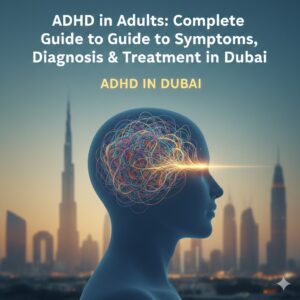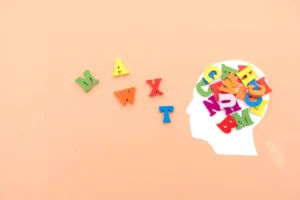The Executive Brain: Why ADHD Is About More Than Attention
This article has been researched and written by Dure Najaf. AI has not been used in producing this article.
When most people think of ADHD, they picture distraction, fidgeting, or forgetfulness. But underneath those behaviors lies something more complex: a difference in how the brain manages its executive functions. These are the mental skills that help us plan, organize, regulate emotions, and stay on track.
ADHD isn’t simply a disorder of attention; it’s a difference in self-regulation and goal-directed behavior. Understanding this helps us assess, support, and empathize more effectively with both children and adults who live with ADHD.
What Are Executive Functions?
Executive functions act like the brain’s management system, coordinating thinking, emotion, and behavior so we can reach goals. Psychologists often group them into three core domains:
- Working Memory – holding information in mind while using it (e.g., remembering instructions while following them).
- Inhibitory Control – pausing before reacting; thinking before acting or speaking.
- Cognitive Flexibility – shifting focus, adapting to change, and finding alternative solutions when plans don’t go as expected.
Together, these processes form what Russell Barkley calls the executive system. In ADHD, this system tends to develop more slowly or operate less efficiently. A child might know what to do but struggle to do it in the moment, not from laziness or defiance, but because their brains ’ self-regulation circuits work differently.
Beyond Attention: The Executive Function Model of ADHD
Earlier models framed ADHD mainly as a problem of sustaining attention. Modern neuroscience paints a richer picture: ADHD reflects differences in executive control — maintaining attention intentionally, regulating impulses, managing motivation, and sustaining effort over time. It’s not about having or lacking attention, but about controlling where it goes. Many people with ADHD describe episodes of “hyperfocus ”: intense concentration on stimulating tasks, alongside difficulty persisting with mundane ones.

How Psychologists Assess Executive Function
When psychologists assess for ADHD, they are mapping the architecture of attention and self-management, not just measuring concentration.
A comprehensive evaluation typically includes:
- Cognitive Testing – Instruments such as the Wechsler Intelligence Scale for Children (V) measure Working Memory and Processing Speed, two key executive domains.
- Attention Tests – Tools like the Test of Everyday Attention for Children (TEA-Ch2) or Continuous Performance Tests (CPTs) assess sustained attention and inhibitory control under structured conditions.
- Behavior Rating Scales – Parent, teacher, or self-report questionnaires (e.g., Conners-4, BRIEF-2) capture everyday behaviors such as disorganization, impulsivity, or difficulty shifting between tasks.
- Clinical Interviews and Observation – Qualitative data reveal how executive skills influence daily functioning, frustration tolerance, and emotional control.
An experienced clinician integrates all these sources to see how executive functioning shapes real-life performance. One child might show strong working memory but weak inhibition, leading to blurting answers or rushing work. Another might test well yet struggle with time management, illustrating the gap between capacity and performance.
When the Executive System Falters
Imagine driving a car. Executive functions are the driver: steering, braking, and planning the route.
In ADHD, the driver sometimes hesitates or gets distracted. The engine (motivation) might rev too high or stall; the steering (focus) can drift toward whatever seems more interesting. That’s why a person with ADHD may complete complex tasks in one setting (like building a model or gaming for hours) yet forget routine chores. The issue isn’t knowledge; it’s self-directed execution.
Difficulties regulating emotion are part of this same picture. The diagnostic criteria for ADHD include emotional dysregulation as an associated feature, and clinicians increasingly treat it as a core target of therapy. Trouble inhibiting emotional reactions or recovering from frustration reflects the same executive-control challenges that underlie attention and impulse regulation.
Rethinking the Label
When we move beyond the word “attention”, ADHD becomes easier to understand and far more human. It’s not a failure of discipline but a different wiring of the executive brain.
Anxiety Disorders Explained: Types, Symptoms & When to Seek Help
This article has been researched and written by Mariam. AI has not been used in producing this article. Worry is part of being human. But when anxiety stops being a passing feeling and starts shaping every decision you make – what you avoid, how you sleep, how you show up at work and in relationships…
ADHD in Adults: Complete Guide to Symptoms, Diagnosis & Treatment in Dubai
This article has been researched and written by Mariam. AI has not been used in producing this article. For many adults living in Dubai, the struggle is familiar: missed deadlines, a desk that never stays organized, conversations you tuned out halfway through, and an inner voice that has spent decades whispering that you are simply…
Mental Health During Ramadan: 7 Tips for Emotional Wellbeing
This article has been researched and written by Mariam. AI has not been used in producing this article. Ramadan is a month of deep spiritual renewal, gratitude, and community. But for many Muslim residents and expats across Dubai and the UAE, it can also bring unexpected emotional challenges. Sleep disruption, fatigue, heightened anxiety during Ramadan,…
Famous People with Dyslexia
Representation matters especially when there is a stigma around dyslexia and learning disabilities in general …
Third Culture Kids: Growing Strong Roots in a Mobile World
In a city like Dubai, it is not unusual to meet a child who has already lived in three countries, attended four different …
What Can I Do If Someone Is Bullying Me at School?
If someone keeps being mean to you, teasing you, hurting you, or leaving you out on purpose, this is called bullying…







